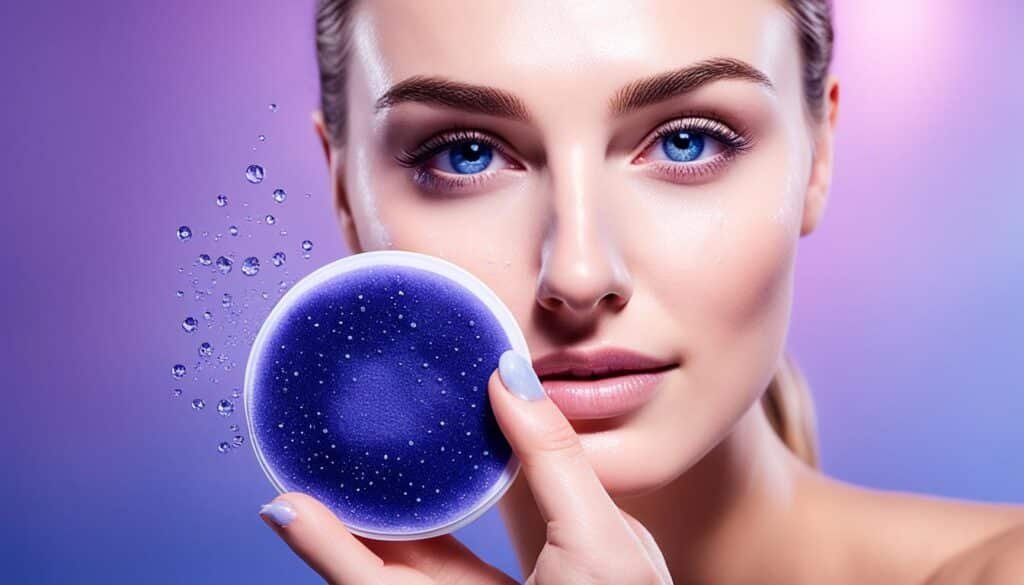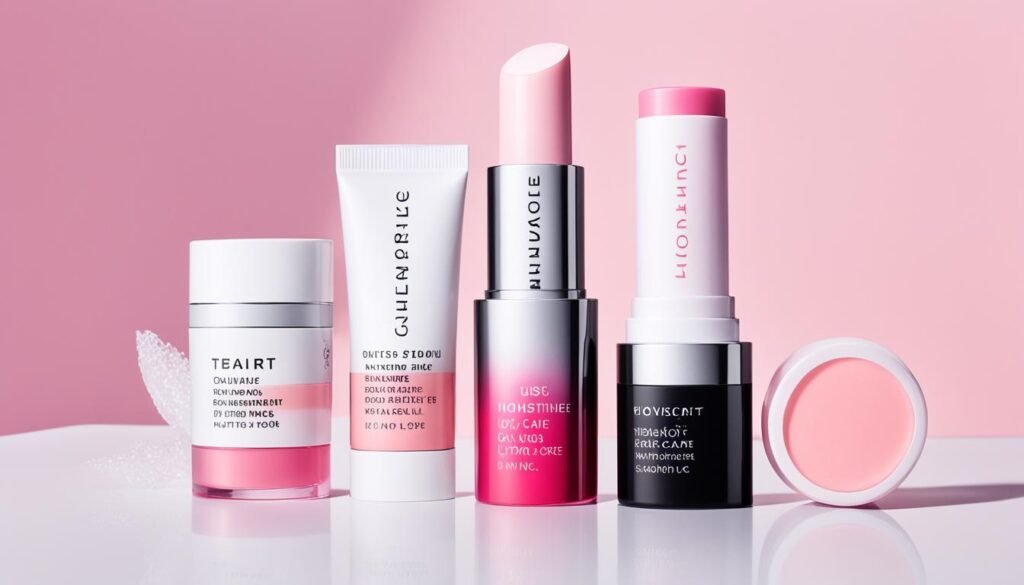A proper nighttime skincare routine is key for beautiful, glowing skin. Cleansing is a top step. It clears away makeup, dirt, oil, and impurities that build up during the day. This prepares your face for serums and moisturizers, allowing these products to work better.
How you cleanse your skin at night is crucial for a healthy complexion. Pick the right products for your skin type. This ensures a deep but gentle clean, making your skin feel fresh. It also sets the stage for your skin’s natural nightly repair process.
Key Takeaways
- Nighttime cleansing is a crucial step in your skincare routine to remove impurities and prepare skin for the next steps.
- Choosing the right cleansing method and products for your skin type is essential for effective and gentle nighttime cleansing.
- Proper nighttime cleansing helps your skin better absorb and benefit from the subsequent products in your routine.
- Thorough yet gentle cleansing is key for maintaining a healthy, radiant complexion.
- Nighttime skin cleansing is an important part of an overall healthy skincare regimen.
Introduction to Nighttime Skincare Routine
Getting plenty of sleep helps us stay healthy. But, for our “beauty sleep,” the right nighttime skincare routine is key. Dermatologist Parvaneh Rafaeloff, M.D., explains that at night, our skin fixes itself. So, a proper nighttime skincare regimen is quite important.
Night is perfect for our skin to repair. There’s less pollution and sun damage risk. Without makeup, our skin can freely breathe and soak up nighttime skincare products.
The Importance of a Nighttime Routine
A nighttime skincare routine is vital for our skin’s health and looks. At night, our skin goes into repair mode. It works hard to rejuvenate and restore itself from the day’s wear and tear.
- Facilitates nighttime skin repair and renewal processes
- Helps counteract daily environmental stressors and damage
- Enhances the skin’s natural regenerative abilities
- Ensures your skin is nourished and hydrated while you sleep
Benefits of a Proper Nighttime Skincare Regimen
A good nighttime skincare routine helps our skin in many ways. It keeps our complexion healthy and glowing. The right routine can really boost our skin’s health.
- Enhances nighttime skin repair and cell turnover
- Reduces the look of fine lines, wrinkles, and age spots
- Targets skin issues like acne, dryness, or uneven tone
- Keeps the skin well-hydrated and nourished at night
- Leaves the face looking radiant and healthy in the morning
By focusing on a solid nighttime skincare routine, we help our skin’s nighttime repair work better. It brings many benefits for our skin’s health and look.
Step 1: Removing Makeup and Cleansing

Proper nighttime makeup removal and skin cleansing are key for good skin. It’s very important to wash away the dirt, oil, and makeup from the day. This keeps your skin healthy and glowing.
Why Removing Makeup is Crucial
If you sleep with makeup on, your pores can get blocked. This can cause spots, make your skin look tired, and lead to various skin problems. Makeup mixed with oils and dirt on your skin makes a perfect place for bacteria. Cleaning your face well at night lets your skin repair itself as you sleep.
Different Types of Cleansers for Nighttime Use
At night, you can pick from a variety of skincare cleansers. Oil cleansers work great for taking off tough makeup and dirt. On the other hand, water-based cleansers give a soft and clean feeling. The best choice is a nighttime cleanser that fits your skin and doesn’t remove its natural oils.
- Oil Cleansers: These are perfect for dissolving makeup and sebum. They keep dry or mature skin moisturized by balancing natural oils.
- Water-Based Cleansers: Gels or foams deeply cleanse without removing too much moisture. They’re good for every skin type, even oily and acne-prone.
Choose your cleanser wisely and apply it with soft, circular movements on your face. This ensures it takes off makeup and dirt completely. After washing your face with warm water, gently dry your skin. That’s the first part of your nighttime skincare done.
Step 2: Exfoliating

Exfoliating is key in your nighttime skin care. It removes dead skin cells and extra dirt. This step helps your skin better absorb other products. This makes sure your skin gets the most from what you use.
But, how do you pick the best exfoliant? It depends on your skin type.
For dry skin, go for gentle exfoliants. These include mild scrubs or chemical exfoliants. They can remove dead cells without taking away your skin’s natural oils.
If your skin is oily, choose physical scrubs with bigger particles. They help remove extra dirt and oil. This can reduce breakouts if you’re prone to acne. These products are great for nighttime exfoliation.
Sensitive skin needs something even milder. Enzyme-based exfoliants are a good choice. They gently soothe your skin. This makes them perfect for night skin care.
No matter your skin type, using exfoliating for skin at night is smart. It helps unveil a smoother, brighter face. Picking the best types of exfoliants is important. It ensures you get the most from this step in your nighttime exfoliation.
Nighttime Skincare Routine

Our skin and our sleep have a lot in common – they both follow a daily cycle. This cycle helps the skin do things like repair itself and create new cells. Knowing this cycle can help us make our nighttime skincare routine work better.
Understanding the Circadian Rhythm of Skin
Our skin’s cycle is connected to our body’s cycle, called our circadian rhythm. This rhythm is like a clock, guiding the skin through different activities. For example, nighttime is when our skin focuses on making new cells and collagen, but during the day, it works hard to protect us with melanin.
Why Nighttime is the Best Time for Skin Repair
At night, our skin doesn’t have to deal with as many things that can harm it, like the sun or pollution. This means it can fully concentrate on fixing and renewing itself without distractions. As a result, we wake up with skin that looks and feels better.
Doing the right things before bed can really help your skin. A proper nighttime skincare routine leads to:
- Enhanced skin cell turnover and regeneration
- Increased collagen production for firmer, more youthful skin
- Improved skin hydration and barrier function
- Reduced inflammation and blemishes
Timing your skincare with your skin’s cycle makes your products work better. This can lead to skin that’s not just healthier but glowing too.
“Evidence suggests that sleep loss can affect our skin hydration and elasticity. But it is important to keep in mind at a molecular level circadian rhythmicity also plays a role.”
– Dr. Nayantara Santhi
Step 3: Toning

Toners are crucial for nighttime skincare. They help your skin balance its pH level after cleansing. It also gets rid of any impurities left. Adding a toner to your routine makes your skin texture better. It also increases hydration and makes your skin glow.
Benefits of Using a Toner
Toners are great for your skin, especially at night. They offer these top advantages:
- They remove any leftover dirt, oil, or makeup after you cleanse.
- They get your skin’s natural pH back in check after cleaning.
- They ready your skin to soak in the benefits of the products you use next.
- They give your skin an extra layer of moisture and nutrients.
- They make pores appear smaller and make your skin feel smoother.
Choosing the Right Toner for Your Skin Type
Not all toners work the same for everyone at night. The toner you pick has to fit your skin’s specific needs. Here’s advice for choosing the best toner for you:
- Dry Skin: Find a toner that hydrates. Look for ingredients like glycerin or rose water. These help add moisture and soothe your skin.
- Oily/Acne-Prone Skin: Select a toner that clarifies. Go for one with salicylic acid or witch hazel. It will control oil and minimize your pores.
- Sensitive Skin: Opt for a gentle toner with no alcohol. Look for ingredients like chamomile or green tea. They’ll relax and nourish your skin.
- Combination Skin: Choose a toner that’s good for both dry and oily spots. An example is a toner that hydrates but also keeps shine away.
Using the right toner at night is key to reaching a healthy, radiant look by morning.
Step 4: Serums and Treatments

Nighttime is great for using special serums and treatments. They work on skin issues like wrinkles, blemishes, and uneven tone.
Antioxidant Serums for Nighttime Use
Antioxidant serums pack a punch when added to your night routine. They have vitamins like C & E and other strong antioxidants. These help fight off damage and support skin repair, leaving you looking more youthful by morning.
Spot Treatments for Blemishes
For breakouts, use spot treatments. They usually have salicylic acid or benzoyl peroxide. This helps clear up pimples and stops new ones from popping up. Nighttime is perfect for them to do their work while you relax.
Remember to apply serums and treatments in the right sequence at night, from lightest to heaviest. This method helps all products get into your skin well. By paying attention, your nightly skincare can really do wonders for your skin.
“Investing in high-quality serums and treatments can make a significant difference in the appearance and health of your skin, especially when used as part of a consistent nighttime routine.”
Step 5: Eye Cream

Using an eye cream at night is key for the skin around your eyes. This area is fragile and easily shows signs of aging. By applying eye cream at night, you protect and refresh your eyes.
For your nighttime eye care, gently pat the cream along the orbital bone, the eye area’s outer edge. Avoid inside the eye, which might irritate. Blend the cream out to the temples too. Doing this daily, morning and night, is best for your eyes.
Eye creams tackle issues like fine lines, wrinkles, dark circles, and puffiness. Use creams with antioxidants, moisturizers, and peptides to feed your eyes while you sleep.
| Ingredient | Benefits |
|---|---|
| Caffeine | Helps reduce puffiness and dark circles by improving microcirculation |
| Vitamin C | Brightens the eye area and promotes collagen production to diminish wrinkles |
| Hyaluronic Acid | Deeply hydrates the delicate skin, plumping and smoothing the appearance of fine lines |
Applying eye cream is a gentle art. Pat it around the eye’s outer edge and avoid direct eye contact. Try to do this every night for the best outcome.
“Caring for your eyes keeps your face looking young and full of life. A top-notch eye cream is a smart skin investment.”
Step 6: Moisturizing

Moisturizing is key in evening skincare and should not be missed. After using serums, it’s important to seal all that goodness in. Moisturizing creates a barrier on your skin, guarding it from harm and looking its best.
Importance of Moisturizing at Night
Skin does its repair work best at night. It’s the top time to add back moisture and nutrients. Good nighttime moisturizing does wonders. It can:
- Stop water loss
- Make lines and wrinkles less noticeable
- Help the skin heal on its own
- Boost the skin’s flexibility and softness
Different Types of Moisturizers for Nighttime Use
For nighttime moisturizers, you’ve got lots of choices. Pick what suits your skin type and concerns best. Lightweight ones are great for oily or combo skin. Richer creams are better if your skin’s dry.
But, whatever your type, choose a nighttime moisturizer with good stuff in it. Think hyaluronic acid, ceramides, and natural oils. This ups the benefits of your night care.
“Proper nighttime moisturizing is essential for keeping your skin healthy, hydrated, and glowing.” – Skincare Expert, Jane Doe
Step 7: Face Oils

Adding face oils at night can really boost your skincare game. These oils are light and soak in quickly. They can help a lot if your skin feels dry, rough, or thirsty.
Benefits of Using Face Oils at Night
Facial oils are perfect for evenings. They seal in moisture, so your skin stays hydrated all night. This creates a barrier that stops your skin from losing water. Your skin will be refreshed and soft.
They also make your skin glow and can make fine lines less noticeable. They might even balance how much oil your skin makes. So, adding face oils to your night routine could give you a brighter morning look.
Choosing the Right Face Oil for Your Skin Type
The best face oil depends on what your skin needs. For people with oily skin or who often get acne, choosing the right oil is crucial. Some oils might not be good for them and could lead to pimples.
It’s a good idea to try out a few different oils to see which your skin likes. Put a few drops on your fingers, rub them to warm the oil, and gently press it onto your skin. See how your skin does and pick the oil that does the best for you.
| Skin Type | Recommended Face Oil |
|---|---|
| Dry | Argan, Marula, or Rosehip Seed Oil |
| Oily | Jojoba, Grapeseed, or Tea Tree Oil |
| Combination | Squalane or Sunflower Seed Oil |
| Sensitive | Chamomile or Camellia Seed Oil |
Start with a small amount of the oil. You can always use more if you need it. Discovering the right face oil may take a bit of trial and error. But, it’s worth it to find one that meets your skin’s needs.
Step 8: Face Masks
Using a face mask at night can really change your skincare game. Face masks for nighttime are packed with great stuff. They tackle your skin issues as you sleep. Whether you need moisture, brightness, or a detox, there’s a face mask for you.
Types of Face Masks for Nighttime Use
- Hydrating face masks: These masks have stuff like hyaluronic acid to deeply hydrate and plump your skin.
- Brightening face masks: With vitamin C, these masks help your skin tone be even and glow.
- Exfoliating face masks: They have gentle exfoliants to remove dead skin. Your face will look smoother and brighter.
- Purifying face masks: Made from clay, these masks pull out dirt and oil. Afterward, your skin feels clean and balanced.
How Often to Use Face Masks
Using a face mask every night isn’t a must. But adding it to your routine a few times weekly is a great idea. Try using a face mask 1-2 times every week, depending on your skin type. For oily or acne-prone skin, more often might be good. Drier skin might only need it once a week.
| Skin Type | Recommended Frequency of Face Masks |
|---|---|
| Oily/Acne-Prone | 2-3 times per week |
| Normal/Combination | 1-2 times per week |
| Dry/Sensitive | 1 time per week |
Always pay attention to how your skin reacts. Tweak your face mask use as needed. Your skin might ask for more or less depending on the time of the year or other things.
Step 9: Lip Care

Lip care is vital, yet many people ignore it in their nighttime skincare. Our lips can dry up and crack while we sleep. Adding a few lip care products to your routine can help a lot.
Importance of Lip Care in a Nighttime Routine
At night, our lips face many problems. For instance, during the day, environmental stress can make them lose their moisture. If we ignore our lips at night, they can dry out. This may lead to chapped lips that are hard to heal.
Products for Nourishing and Hydrating Lips
For soft, healthy lips at night, think about these nighttime lip care items:
- Hydrating lip balm or ointment: Choose ones with shea butter, beeswax, or jojoba oil. These ingredients help keep moisture and stop water loss.
- Lip scrub: Use a lip scrub to gently remove flaky skin. This helps your lips absorb moisture better.
- Overnight lip mask: Before sleep, use a lip mask for deep hydration. This can make your lips feel fresh when you wake up.
By adding these night products to your routine, your lips will be well-prepared for the new day. They will be healthy, hydrated, and smooth.
“Healthy, hydrated lips are the foundation of a radiant, youthful-looking complexion. Don’t neglect this important step in your nighttime skincare routine.”
Also Read: Best Skincare Tips For Summer: Keep Your Skin Glowing
Conclusion
Having a good nighttime skincare routine is key for beautiful skin. It includes steps like taking off makeup, cleansing, toning, and using special serums. You also need to remember things like applying eye cream, moisturizing, and adding face oils and masks.
These steps help nourish and repair your skin while you sleep. So, when morning comes, your skin will be fresh, glowing, and ready for the day. This nighttime skincare routine is really important for your skin’s health and look.
It lets your skin recover from the day and helps it fight off problems like blemishes and fine lines. By making time for this routine, you’re doing something really great for your skin. With a little effort, you can have healthier, beautiful skin every day.
FAQs
How should you cleanse your skin in your nighttime skincare routine?
At night, it’s key to clear your skin of dirt, oil, and makeup. Consider using a gentle oil cleanser. It removes impurities and leaves your skin feeling fresh.
What are the benefits of a proper nighttime skincare regimen?
Night routines are essential for your skin’s repair and health. They help build up the natural barrier and improve skin overall. It’s also the best time for your skin to repair itself without any external harm
Why is removing makeup important in a nighttime skincare routine?
Getting rid of makeup lets your skin breathe. It also helps other products, such as moisturizers, work better on your skin.
How do you choose the right exfoliant for your skin type?
Dry skin loves gentle chemical or physical exfoliants. Oily skin thrives with stronger scrubs. Sensitive skin does well with enzyme-based exfoliants.
How does the skin’s circadian rhythm affect nighttime skincare?
Our skin changes with the day. It repairs best at night, with no pollution or sun harming it. So, nighttime is prime time for skincare to work best.
What are the benefits of using a toner in a nighttime routine?
Toners balance your skin and wipe away dirt and oil. They also prime your skin to soak up nourishing products.
How do serums and treatments differ from moisturizers in a nighttime routine?
Serums and treatments are focused on specific skin issues. Moisturizers, however, mainly hydrate and protect your skin.
Why is applying eye cream important at night?
Applying eye cream at night shields the delicate eye area from harm. It also fights against early signs of aging.
How do you choose the right moisturizer for your skin type at night?
If you have oily or combo skin, pick a light lotion or gel. Dry skin benefits more from a heavy cream or ointment.
What are the benefits of using a face oil in your nighttime routine?
Face oils lock in moisture and nourish your skin. They’re great for most skin types, but maybe not for oily skin. So, choosing the right one is crucial.
How often should you use a face mask as part of your nighttime routine?
Use a face mask 1-2 times a week. It will help boost the effects of your other skincare products and address specific skin concerns.
Why is lip care important in a nighttime skincare routine?
Don’t forget about your lips at night. They can become dry and chapped. A hydrating lip balm or scrub keeps them soft and healthy.




